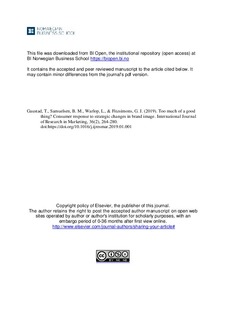Too much of a good thing? Consumer response to strategic changes in brand image
Journal article, Peer reviewed
Accepted version
Permanent lenke
http://hdl.handle.net/11250/2609366Utgivelsesdato
2019Metadata
Vis full innførselSamlinger
- Publikasjoner fra CRIStin - BI [1015]
- Scientific articles [2181]
Originalversjon
International Journal of Research in Marketing. 2019, 36(2) 264-280. 10.1016/j.ijresmar.2019.01.001Sammendrag
The current research investigates a potential disadvantage of building brand associations that resonate with consumers' identities and facilitate consumer–brand bonding. The authors propose a theory of consumer response to changes that either dampen or augment the associations central to brand image (e.g., due to brand acquisitions or repositioning). The results show that consumers with a high degree of self–brand connection respond more negatively than others do to changes that dampen brand associations. Counterintuitively, changes augmenting brand associations can also lead to unfavorable consumer sentiments in certain instances. When brand connection was linked to an ideal self-identity (i.e., self-enhancement motives), changes that augmented the brand image increased the brand's ability to signal an ideal identity. Conversely, when brand connection was linked to the actual self-identity (i.e., self-verification motives), augmenting brand image reduced the perceived similarity between the self and the brand, thus causing brand identification to deteriorate.

